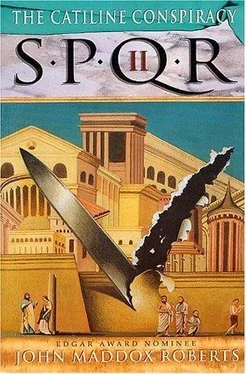John Roberts - The Catiline Conspiracy
Здесь есть возможность читать онлайн «John Roberts - The Catiline Conspiracy» весь текст электронной книги совершенно бесплатно (целиком полную версию без сокращений). В некоторых случаях можно слушать аудио, скачать через торрент в формате fb2 и присутствует краткое содержание. Жанр: Исторический детектив, на английском языке. Описание произведения, (предисловие) а так же отзывы посетителей доступны на портале библиотеки ЛибКат.
- Название:The Catiline Conspiracy
- Автор:
- Жанр:
- Год:неизвестен
- ISBN:нет данных
- Рейтинг книги:3 / 5. Голосов: 1
-
Избранное:Добавить в избранное
- Отзывы:
-
Ваша оценка:
- 60
- 1
- 2
- 3
- 4
- 5
The Catiline Conspiracy: краткое содержание, описание и аннотация
Предлагаем к чтению аннотацию, описание, краткое содержание или предисловие (зависит от того, что написал сам автор книги «The Catiline Conspiracy»). Если вы не нашли необходимую информацию о книге — напишите в комментариях, мы постараемся отыскать её.
The Catiline Conspiracy — читать онлайн бесплатно полную книгу (весь текст) целиком
Ниже представлен текст книги, разбитый по страницам. Система сохранения места последней прочитанной страницы, позволяет с удобством читать онлайн бесплатно книгу «The Catiline Conspiracy», без необходимости каждый раз заново искать на чём Вы остановились. Поставьте закладку, и сможете в любой момент перейти на страницу, на которой закончили чтение.
Интервал:
Закладка:
Caliga: The Roman military boot. Actually, a heavy sandal with hobnailed sole.
Campus Martius: A field outside the old city wall, formerly the assembly area and drill field for the army. It was where the popular assemblies met. By late Republican times, buildings were encroaching on the field.
Censor: Magistrates elected usually every fifth year to oversee the census of the citizens and purge the roll of Senators of unworthy members. They could forbid certain religious practices or luxuries deemed bad for public morals or generally "un-Roman." There were two Censors, and each could overrule the other. They wore the toga praetexta and sat in the sella curulis, but since they had no executive powers they were not accompanied by lictors. The office did not carry the imperium. Censors were usually elected from among the ex-Consuls, and the censorship was regarded as the capstone of a political career.
Centuriate Assembly: (comitia centuriata) Originally, the annual military assembly of the citizens where they joined their army units ("centuries"). There were one hundred ninety-three centuries divided into five classes by property qualification. They elected the highest magistrates: Censors, Consuls and Praetors. By the middle Republic, the centuriate assembly was strictly a voting body, having lost all military character.
Centurion: "Commander of 100"; i.e., a century, which, in practice, numbered around sixty men. Centurions were promoted from the ranks and were the backbone of the professional army.
Circus: The Roman racecourse and the stadium which enclosed it. The original, and always the largest, was the Circus Maximus, which lay between the Palatine and Aventine hills. A later, smaller circus, the Circus Flaminius, lay outside the walls on the Campus Martius.
Client: One attached in a subordinate relationship to a patron, whom he was bound to support in war and in the courts. Freedmen became clients of their former masters. The relationship was hereditary.
Coemptio: Marriage by symbolic sale. Before five witnesses and a libripens who held a balance, the bridegroom struck the balance with a bronze coin and handed it to the father or guardian of the bride. Unlike conferreatio, coemptio was easily dissolved by divorce.
Cognomen: The family name, denoting any of the stirpes of a gens; i.e., Caius Julius Caesar: Caius of the stirps Caesar of gens Julii. Some plebeian families never adopted a cognomen, notably the Marii and the Antonii.
Coitio: A political alliance between two men, uniting their voting blocs. Usually it was an agreement between politicians who were otherwise antagonists, in order to edge out mutual rivals.
Colonia: Towns which had been conquered by Rome, where Roman citizens were settled. Later, settlements founded by discharged veterans of the legions. After 89 B.C. all Italian colonia had full rights of citizenship. Those in the provinces had limited citizenship.
Compluvium: An opening in a roof to admit light.
Conferreatio: The most sacred and binding of Roman forms of marriage. The bride and groom offered a cake of spelt to Jupiter in the presence of a pontifex and the flamen Dialis. It was the ancient patrician form of marriage. By the late Republic it was obsolete except for some priesthoods in which the priest was required to be married by conferreatio.
Consul: Supreme magistrate of the Republic. Two were elected each year. Insignia were the toga praetexta and the sella curulis. Each Consul was attended by twelve lictors. The office carried full imperium. On the expiration of his year in office, the ex-Consul was usually assigned a district outside Rome to rule as proconsul. As proconsul, he had the same insignia and the same number of lictors. His power was absolute within his province.
Curia: The meetinghouse of the Senate, located in the Forum.
Dictator: An absolute ruler chosen by the Senate and the Consuls to deal with a specific emergency. For a limited period, never more than six months, he was given unlimited imperium, which he was to lay down upon resolution of the emergency. Unlike the Consuls, he had no colleague to overrule him and he was not accountable for his actions performed during office when he stepped down. His insignia were the toga praetexta and the sella curulis and he was accompanied by twenty-four lictors, the number of both Consuls. Dictatorships were extremely rare and the last was held in 202 B.C. The dictatorships of Sulla and Caesar were unconstitutional.
Dioscuri: Castor and Pollux, the twin sons of Zeus and Leda. The Romans revered them as protectors of the city.
Eques: (pl. equites) Formerly, citizens wealthy enough to supply their own horses and fight in the cavalry, they came to hold their status by meeting a property qualification. They formed the moneyed upper-middle class. In the centuriate assembly they formed eighteen centuries and once had the right of voting first, but they lost this as their military function disappeared. The publicans, financiers, bankers, moneylenders and tax-farmers came from the equestrian class.
Faction: In the Circus, the supporters of the four racing companies: Red, White, Blue and Green. Most Romans were fanatically loyal to one of these.
Fasces: A bundle of rods bound around an ax with a red strap, symbolizing a Roman magistrate's power of corporal and capital punishment. They were carried by the lictors who accompanied the curule magistrates, the Flamen Dialis, and the proconsuls and propraetors who governed provinces. When a lower magistrate met a higher, his lictors lowered their fasces in salute.
Flamen: A high priest of a specific god of the state. The college of flamines had fifteen members: three patrician and twelve plebeian. The three highest were the Flamen Dialis, the Flamen Martialis and the Flamen Quirinalis. They had charge of the daily sacrifices and wore distinctive headgear and were surrounded by many ritual taboos. The Flamen Dialis, high priest of Jupiter, was entitled to the toga praetexta, which had to be woven by his wife, the sella curulis and a single lictor, and he could sit in the Senate. It became difficult to fill the college of flamines because they had to be prominent men, the appointment was for life and they could take no part in politics.
Forum: An open meeting and market area. The premier forum was the Forum Romanum, located on the low ground surrounded by the Capitoline, Palatine and Caelian hills. It was surrounded by the most important temples and public buildings. Roman citizens spent much of their day there. The courts met outdoors in the Forum when the weather was good. When it was paved and devoted solely to public business, the Forum Romanum's market functions were transferred to the Forum Boarium, the cattle market, near the Circus Maximus. Small shops and stalls remained along the northern and southern peripheries, however.
Freedman: A manumitted slave. Formal emancipation conferred full rights of citizenship except for the right to hold office. Informal emancipation conferred freedom without voting rights. In the second or at latest third generation, a freedman's descendants became full citizens.
Genius: The guiding and guardian spirit of a person or place. The genius of a place was called genius loci.
Gens: A clan, all of whose members were descended from a single ancestor. The nomen of a patrician gens always ended with -ius. Thus, Caius Julius Caesar was Caius, of the Caesarian stirps of gens Julii.
Gladiator: Literally, "swordsman." A slave, prisoner of war, condemned criminal or free volunteer who fought, often to the death, in the munera. All were called swordsmen, even if they fought with other weapons.
Gladius: The short, broad, double-edged sword borne by Roman soldiers. It was designed primarily for stabbing. A smaller, more antiquated design of gladius was used by gladiators.
Читать дальшеИнтервал:
Закладка:
Похожие книги на «The Catiline Conspiracy»
Представляем Вашему вниманию похожие книги на «The Catiline Conspiracy» списком для выбора. Мы отобрали схожую по названию и смыслу литературу в надежде предоставить читателям больше вариантов отыскать новые, интересные, ещё непрочитанные произведения.
Обсуждение, отзывы о книге «The Catiline Conspiracy» и просто собственные мнения читателей. Оставьте ваши комментарии, напишите, что Вы думаете о произведении, его смысле или главных героях. Укажите что конкретно понравилось, а что нет, и почему Вы так считаете.










